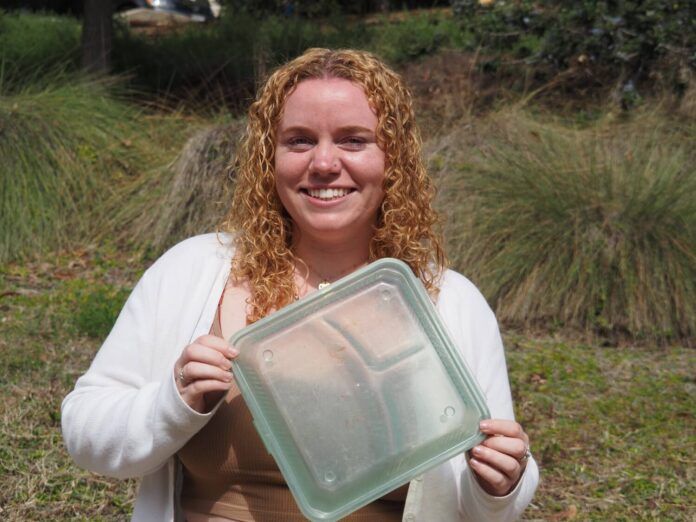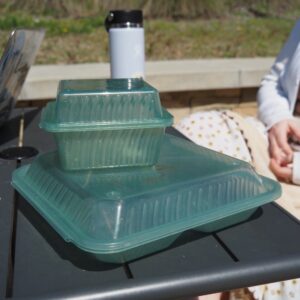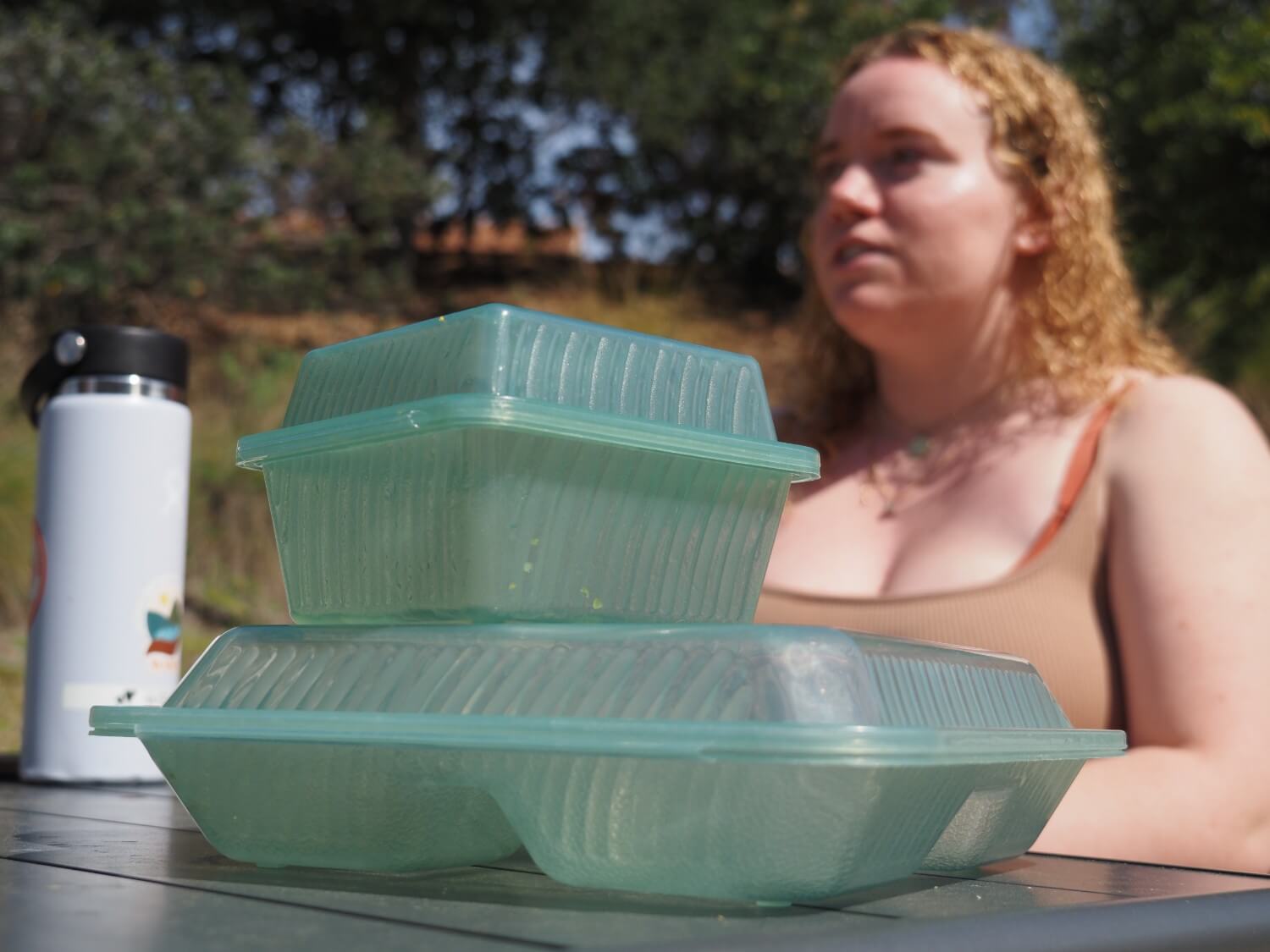
Occidental students regularly engage with the food system that provides their meals, but seniors Isabelle Russell and Isa Merel have engaged with these systems in a different way. Merel oversees sustainability programs in dining, while Russell reported on the functioning of Campus Dining, from food procurement to dealing with food waste. Russell spent the summer teaching herself InDesign and creating the new 2021-22 Food at Oxy Guide, a colorful 21-page report of the past year as seen through Occidental’s food systems. In the works for nearly a year, the completed report arrived in student’s email inboxes Feb. 23.
The Food at Oxy Guide has long been a way for Campus Dining to gather information about their own practices and the work of student groups across campus, according to Russell, former Food Systems Working Group student co-chair and sustainability liaison student intern.
“The goal of the Food at Oxy Guide, and its real purpose, is to be a living document, to keep track of the different programs and the different dates that exist on campus,” Russell said.
According to Russell, the guide provides information on topics ranging from Campus Dining’s food procurement and sustainability initiatives to programming events and student groups.

The guide hasn’t always been readily accessible, Russell said. For the past ten years, the Food at Oxy Guide was one long Google document, lacking photos and sparsely hyperlinked, which new interns added to every year. By the time Russell became an intern the document totaled 40 pages, she said.
“It was just not interactive at all,” Russell said.
According to Russell, the version now in students’ inboxes is the culmination of conversations between herself, Merel and Urban & Environmental Policy Institute Director and professor Sharon Cech about a user-friendly guide last year. Russell said she hopes that the new guide — which is 20 pages shorter than the original and pairs updated written information with pictures and graphics — will provide a framework for future interns so they do not need to start from scratch again.
One section of the guide that has seen considerable updates from past years is Sustainable Waste Management, according to Merel, the Campus Dining lead intern. This section of the guide details current efforts to reduce food waste and single-use containers on campus, and includes the Eco-Clamshell Program and the partnership between FEAST and LA Compost.

Merel said this Sustainable Waste Management section is particularly important to her because tackling food waste is an easy first step to addressing other sustainability issues.
“Once you start thinking about recycling and compost, you start thinking, ‘Well, what if we can reduce how much we’re making in the first place?’ And then that leads to zero waste, no plastic, no single use plastic and all that,” Merel said.
The Excess Food Recovery Team (EFRT), profiled in Sustainable Waste Management section, works to promote food justice and reduce food waste on campus, in part through food recovery, according to EFRT coordinator Lina Sullivan (senior). Sullivan said EFRT partners Los Angeles organizations including the Hollywood Food Coalition, Food Forward and the LA Community Fridge Network.
“[Food recovery] is basically taking food that would otherwise be wasted and getting it to people who need it. So that combats food insecurity and food waste at the same time,” Sullivan said.
This can take the form of distributing Campus Dining’s extra frozen food, collecting excess food at the Hollywood Farmers Market and stocking community fridges around LA, according to Sullivan. Through these programs, EFRT has redistributed over 10 tons of food to date and 10,895 pounds of food from the Marketplace alone during the 2021-2022 academic year, according to the Food at Oxy Guide.
Another important update was made to the Food Procurement section of the guide, Russell said. This section traces Occidental’s score on the Real Foods Challenge (RFC) since implementation at the college in 2014. According to Merel, RFC is a nonprofit organization, and allows Campus Dining to determine how much of their budget is being spent on “Real Food” — food that meets one or more of the following four criteria: ecologically sound, humane, fair trade or local and community based. Prior to 2020, Occidental had an RFC score of 29 percent according to the guide. However, the pandemic had a severe impact on food sourcing and supply chains across the country and these disruptions contributed the lowering of Occidental’s 2021-2022 RFC score to 13 percent, Russell said.
“[Supply chain disruptions] ultimately impacted our sustainability initiatives and the Real Food Challenge, because Campus Dining had to focus on feeding students,” Russell said. “We really had to focus on getting to normalcy or relative normalcy before being able to re-start the Real Food Challenge. During the process, we were still tracking our real food percentage, but we weren’t actively trying to switch products and actively trying to increase our number. Because the supply chains were so broken that it would be impossible to even get that product.”
As Campus Dining continues to recover from the pandemic, Russell said students can still make their voices heard through the purchasing power they possess as a result of Occidental’s a la carte dining system. By buying real foods items — which are labelled “fair labor practices,” “humane,” “locally sourced” and “ecologically sound” — in the Marketplace and Tiger Cooler, students can demonstrate that there is a demand for these products, Russell said.
Another way students can engage with these issues is by attending the Food Systems Working Group meetings that take place twice per semester, according to Russell. The meetings are a gathering place for people and organizations across campus who are interested in food issues, Russell said.
“[It’s] really just a space for everyone to convene twice a semester and provide one another with updates on their work, and also the space to collaborate on problems and find solutions,” Russell said.
Now that the guide is published, Merel said she is excited to see students read it, ask questions and incorporate the findings into both their academic and social involvement on campus.
“I think having questions that can be answered by the guide, and then asking questions that are then prompted by the guide, is the way that I would love to see people interact with it more,” Merel said.
Contact Claire O’Callahan at ocallahan@oxy.edu.
![]()






























